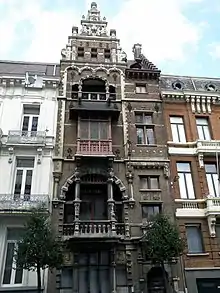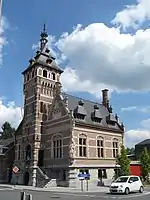Jean-Jacques Winders
Jean-Jacques Winders (14 May 1849, Antwerp – 20 February 1936, Antwerp) was a Belgian architect.
Jean-Jacques Winders | |
|---|---|
 Jean-Jacques Winders, portrayed by Edouard de Jans | |
| Born | Joannes Jacobus Henricus Victor Winders 14 May 1849 |
| Died | 20 February 1936 (aged 86) Antwerp, Belgium |
| Nationality | Belgian |
| Occupation | Architect |
| Buildings | Royal Museum of Fine Arts in Antwerp (with Frans Van Dijk) Monument Schelde Vrij in Antwerp |
He designed the Royal Museum of Fine Arts in Antwerp with Frans Van Dijk, the Schelde Vrij monument and his own house De Passer from 1883, which was protected as a monument in Belgium in 1981. Initially he designed buildings in an eclectic style, from 1880 his designs were in the Flemish neo-Renaissance style, of which his house is a typical example.
Biography

Joannes Jacobus Henricus Victor Winders was born in Antwerp on 14 May 1849.[1] He came from an Antwerp family that was active in the construction industry. His grandfather was a contractor and his father, Jean-Baptiste Winders, was a contractor-architect who, from 1859, played a role in the construction of the Brialmont Forts around the city. The young Jean-Jacques Winders followed in his father's footsteps, attending his father's construction sites since he was 17. He then studied at the Royal Academy of Fine Arts of Antwerp. By 1868 he had established himself as an architect, realizing the Antwerp house of painter Jules Wagner that year.[1]
His first remarkable assignment was the Monument Schelde Vrij in Antwerp. He won the design competition for the monument in 1873, and although it was supposed to be finished by the next year, delays postponed its inauguration, which took place in 1883.[2][3] Another important assignment was the Royal Museum of Fine Arts in Antwerp, which he designed with Frans Van Dijk.[3][4] Winders' style was initially eclectic, but in the late 1870s he drastically change his style to Flemish neo-Renaissence style, of which he became one of the most important exponents.[3] His most important work in this style is his own house, Den Passer on Tolstraat in Antwerp.[3]
Winders was also a teacher, and taught at the Royal Academy of Fine Arts of Antwerp from 1895.[3]
His son Max followed in his footsteps becoming an architect as well.[5]
Selected works
- 1873–1883: Monument Schelde Vrij on Marnixplaats in Antwerp
- 1885: Tobacco factory Stanislas Pauwels on Wijngaardstraat in Antwerp
- 1883: Entrepot Steenacker on Sanderusstraat in Antwerp
- 1884–1990: Royal Museum of Fine Arts of Antwerp with Frans Van Dijk
- 1885: Town Hall of Gilly
- 1896: Town Hall of Emblem
- 1906: Post Office of Mortsel
References
- Archives d'architecture moderne (Brussels, Belgium). Musée, Maurice Culot, Anne van Loo, Archives d'architecture moderne (Brussels, Belgium), Victor-Gaston Martiny (1986). van Loo, Anne; Culot, Maurice (eds.). Musée des Archives d'architecture moderne, Fondation Robert-L. Delevoy collections · Volume 1 (in French). Le Musée. ISBN 9782871430407. Retrieved 31 January 2022.
{{cite book}}: CS1 maint: multiple names: authors list (link) - "Monument Schelde Vrij". id.erfgoed.net. Inventaris Vlaanderen. Retrieved 26 January 2022.
- "Winders, Jean Jacques". id.erfgoed.net. Inventaris Vlaanderen. Retrieved 31 January 2022.
- "Jean Jacques Winders (1849-1936)" (PDF). Archives d'Architectes Modernes. 25 September 2013. Retrieved 26 January 2022.
- de Meyer, Jan; Meganck, Leen; van Santvoort, Linda (2014). Regionalism and Modernity Architecture in Western Europe, 1914-1940v. Leuven University Press. ISBN 9789058679185. Retrieved 26 January 2022.
Further reading
- Bart VAN LAEKEN, Jean-Jacques Winders, in het Nationaal Biografisch Woordenboek, deel 16, kol. 887–890, Brussel, 2002
- Herman STYNEN, "Kunst brengt gunst", Jean Jacques Winders (1849–1936) en de neo-Vlaamse renaissance, in: Monumenten & Landschappen, pp. 6–26, Brussel, 1986
- Jacques LAVALLEYE, Jean-Jacques Winders, in de Biographie Nationale, deel 35, kol. 754–755, Brussel, 1970
- Paul SAINTENOY,Notice sur Jean-Jacques Winders, in Annuaire de l'Académie royale de Belgique 1937, pp. 31–46, Brussel, 1937
External links
 Media related to Jean-Jacques Winders at Wikimedia Commons
Media related to Jean-Jacques Winders at Wikimedia Commons- Biography at www.schoonselhof.be
- Biography Archives d'Architectes Modernes
- List of designs and works by Winders
![]() Media related to Jean-Jacques Winders at Wikimedia Commons
Media related to Jean-Jacques Winders at Wikimedia Commons

.jpg.webp)

.jpg.webp)